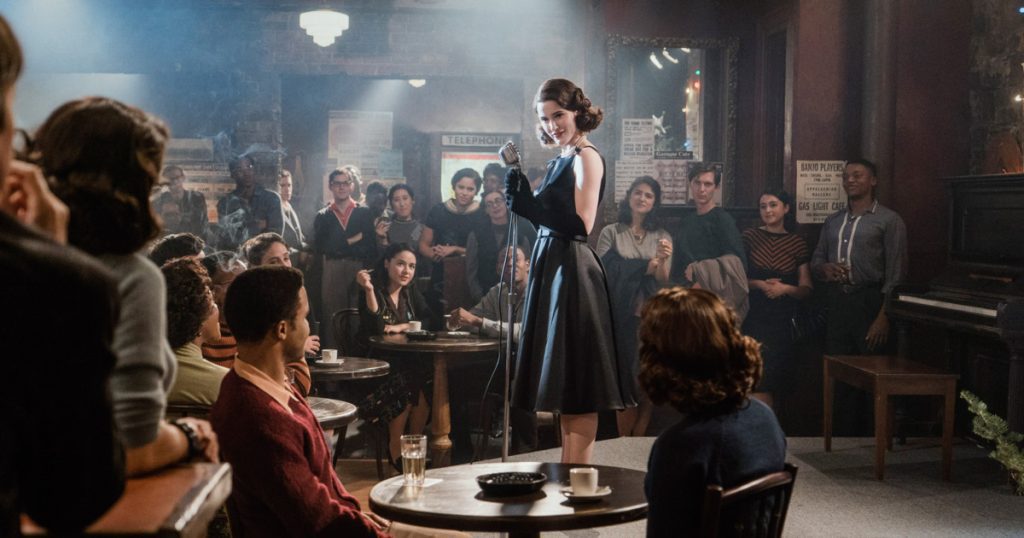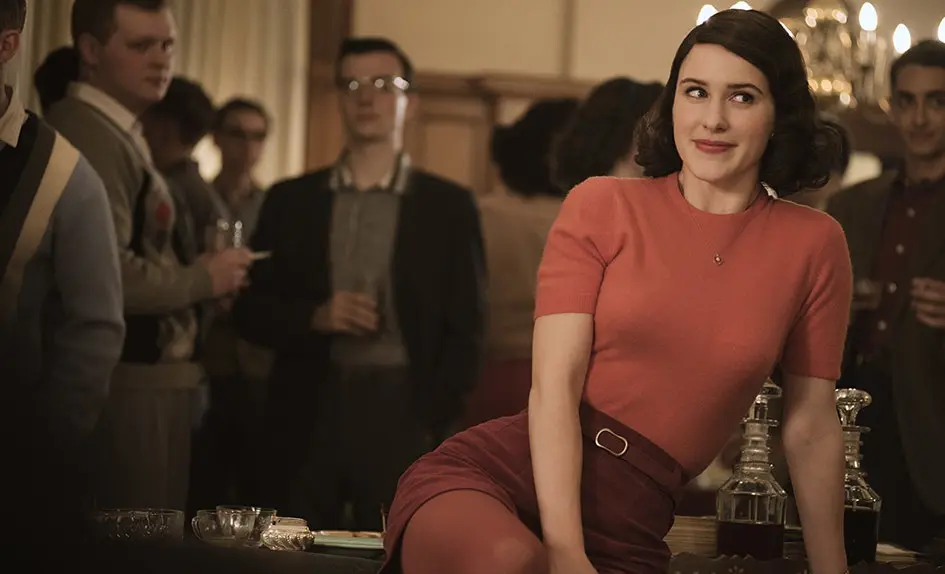Summary
Very aptly described, The Marvelous Mrs. Maisel manages to have an entire host of delightful surprises.
The Marvelous Mrs. Maisel begins as any sensible series of its particular name should begin: by showcasing Mrs. Maisel marvellously. Right off the bat, we see Mrs. Maisel (Rachel Brosnahan) at what is arguably the most pivotal point in any person’s life by seeing her at her wedding. Here she is providing the most vivid portrait of herself, both deliberately and inadvertently, and we, like her wedding audience, are absolutely enthralled in the narrative she tells and in the portrait she paints. We adore her even as we realize that people of her peculiar character usually are quite repulsive. We are surprised at how charming she is.
But maybe we shouldn’t be all that surprised that we are so enthralled by Mrs. Maisel because, throughout the whole affair, she lets us know that she knows she should be repulsive and that it is her strength that she isn’t, that we cannot resist her. What’s more, she positions her boasting and subsequent circumvention of being repulsive as an intellectual challenge, one meant to make us better, instead of one centred in vindictiveness. The strange embodiment of this dichotomy is perfectly encapsulated in the fact that this Jewish girl, on her wedding day, with Jewish attendees, at the end of her wedding toast, hilariously informs everyone present that the food they have already peaceably ingested is indeed not kosher, so deal with it.
Mrs. Maisel does have problems, unfortunately, and they’re rather tragic. Despite being humorous, sociable, ambitious, smart, glowing, observant, provocative, sweet, strategic, and most significantly, despite having an indomitable spirit, deeply embedded within her is the Achilles’ heel of being incorrigibly histrionic. This means she is perfectly willing to tell small lies to herself in order to supplement the self-image she has of herself or to politely finagle that same image of herself into the minds of others. Mrs. Maisel does it with ease and without end. The series is largely about how she learns that those small lies aggregate.
Her first small lie — and the one that propels this series — is the lie she tells about romance. In her mind, romance is an epic struggle of the will against the universe that would otherwise deny you happiness and ultimate entertainment in tranquility, which therefore requires a plan to have come to fruition. Fortunately, she thinks, there are already guidebooks, as humble as they are: Everything in her life would happen as if she were the princess of a fairy tale. All of her carefully-considered goals and accomplishments would be but the preamble of meeting a man, the perfect man, she says. He would be tall, dark and handsome. He would be cultured, taking her to art galleries, poetry readings and showings of Greek drama. Love would be great. But, though she marries — or, at the start of the series, is just over the threshold of marriage — these things never happen. The marvellous Mrs. Maisel’s biggest problem is Mr. Maisel.

Joel Maisel (Michael Zegen) is a poseur, which isn’t itself the problem, as the problem is that he has none of the redeeming qualities that his wife Miriam has, in addition to being generally weak. Joel also doesn’t look the part. It’s not really that Miriam looks too good for him but that he looks slimy, that he seems to have nothing going for him when they first meet and seems to still be in that condition even after they’re married. For what he’s doing as a profession, he has no pleasure, and for what he wants to do, he has no talent. But Joel has no strength to make a change in his condition, to assert any agency over his own life in order to achieve what he wants. He merely accepts what’s given to him, whether advantageous or not, all the while quietly complaining. As a result, he always seems as if he’s sneaking around in places he doesn’t belong. One cumulative manifestation of these trait of his is that, in his marriage, he continues to need Miriam to tell lies about him to bolster his personal and social standing, and yet he shows her the least possible amount of appreciation for her efforts.
Miriam’s loveliness and Joel’s cruddiness is the stage from which the comedy and drama of The Marvelous Mrs. Maisel is launched. Created by Amy Sherman-Palladino, the series smacks of the same brilliance as was shown on Sherman-Palladino’s Gilmore Girls, though strong arguments can be made that she has never had all cylinders of a show running as smoothly as this. The production design of the series is convincing, taking us back to the late 1950s. The cinematography is crisp, the camera work adept, very intimate and fluid, often allowing for visual surprises. The music is period-appropriate and thematic, unobtrusively providing insight into the moment or into the mind of a character should viewers be willing to listen. The writing is superb, investing the characters who are meant to be smart with surreal intelligence, those who are meant to be dumb with disarming stupidity.
So while all of the production is incredibly excellent, the true standouts of this series are the actors who seamlessly inhabit the trappings of 1950s America and cause viewers to feel as if they were indeed being given a glimpse back in time to observe the goings-on around a legendary Mrs. Maisel. The standout of the standouts is Rachel Brosnahan, playing Mrs. Miriam Maisel, who is nothing less than a revelation in the role when compared to the parts she has had in the past, especially that which was something of abuse tendered to her with her role in House of Cards. Tony Shalhoub as Abraham Weissman is also great, playing her father, worried for her future but slowly coming to admire her courage and strength. Marin Hinkle is great as Miriam’s mother, Rose Weissman, playing the line between neurotic and necessarily ordered and conscientious. Finally, Alex Borstein is absolutely delightful as Susie Meyerson, teaching Miriam that there is a world beyond the one she knows and that it might be worthwhile to make an effort exploring it from time to time. These central characters individually have wisdom that would typically account for the combined wisdom of the whole cast of characters in other shows.
The Marvelous Mrs. Maisel is truly an extraordinary treat, deserving all the awards it has received, and should one day see itself included in a TV equivalent for the National Film Registry at the Library of Congress for being culturally, historically, and aesthetically significant. And this is season one of the series, saying nothing yet of season two.



